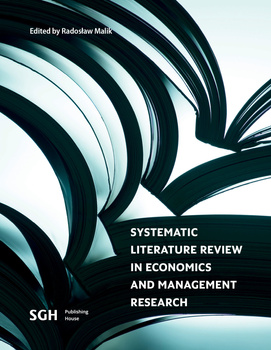
[[[separator]]]
This scientific monograph comprises nine chapters authored by students of SGH Warsaw School of Economics who participated in the fifth edition of the Young Scientist Programme in the academic year 2023/2024. The Young Scientist Programme at SGH Warsaw School of Economics is an initiative dedicated to the scientific advancement of talented individuals who, during their bachelor’s and master’s studies, have demonstrated a robust interest in research along with a commitment to developing critical competences necessary for successful research careers. The chapters featured in this collection span a broad spectrum of research areas, with a particular emphasis on economics, management, and finance. The complexity of the research topics tackled by the chapter authors, along with the introduction of numerous innovative perspectives on these themes, not only underscores their curiosity and ingenuity but also augurs well for their future scientific achievements. Each chapter presents unique insights and findings, contributing to the broader discourse within their respective fields. This engagement with novel research topics enhances both the academic profiles of the contributors and enriches the academic community’s understanding of complex economic, managerial, and financial issues. The quality of the research presented in these chapters attests to the effectiveness of the Young Scientist Programme at SGH Warsaw School of Economics in nurturing students’ research capabilities. By equipping young scholars with the tools to conduct rigorous research and to innovate within their fields, the programme paves the way for their future roles as thought leaders in the academic and professional worlds. This publication not only showcases their current achievements but also heralds the significant potential of these young researchers to influence and shape the future of economic sciences. The texts included in this monograph apply the Systematic Literature Review (SLR) as a primary research method. The SLR is an indispensable tool in scientific research, providing a thorough overview of the existing evidence related to a specific research question and is extensively employed across various disciplines. The multitude of benefits associated with the SLR has solidified its reputation as a reliable and valid research method, justifying its use throughout this publication. Among its numerous advantages, the clarity and reliability it brings to research are particularly noteworthy. Systematic literature reviews are critical in enhancing the clarity of existing research. They aid researchers in synthesizing the findings from multiple studies, offering a clear and explicit account of the current state of knowledge on a particular topic. The clarity provided by the SLR is essential, as it allows researchers to pinpoint precisely areas where a predominant research consensus exists. This capability is crucial for synthesizing the broad spectrum of existing knowledge into a coherent overview, effectively capturing the current state of the art within any given research theme. By identifying well-established findings and widely accepted theories, the SLR helps to solidify what is known and acknowledged across the academic community. Moreover, the reliability of the SLR stems from its rigorous and transparent procedures, which help identify biases and limitations in individual studies, thereby supporting valid conclusions based on the available evidence.
(Excerpt from the introduction )
[[[separator]]]
Preface
Radosław Malik
Chapter 1
Demography and the Natural Interest Rate. How Does an Ageing Society Affect It?
Piotr Zawadzki
Chapter 2
Natural Rate of Interest: Analyzing the Decline and Determinants of the Trend
Jakub Łaszkowski
Chapter 3
Intergenerational Mobility in the United States
Bartłomiej Florek
Chapter 4
Determinants of Foreign Direct Investment Inflows to India
Krzysztof Kiśluk
Chapter 5
Prospects for Offshore Wind Power Development in the People’s Republic of China
Jakub Kłosek
Chapter 6
Dividend Policy in Companies in the Context of the ESG Concept
Konrad Kochalski
Chapter 7
Navigating the Nexus of Institutional Determinants of Academic Entrepreneurship
Julian Smółka
Chapter 8
Swipe Left on Violence: A Systematic Literature Review of Technology-Facilitated Domestic Violence
Martyna Smółka
Chapter 9
The Ultra Vires Ruling of the German Constitutional Court on the Public Sector Purchase Programme
Kamil Polański
Opis
Wstęp
This scientific monograph comprises nine chapters authored by students of SGH Warsaw School of Economics who participated in the fifth edition of the Young Scientist Programme in the academic year 2023/2024. The Young Scientist Programme at SGH Warsaw School of Economics is an initiative dedicated to the scientific advancement of talented individuals who, during their bachelor’s and master’s studies, have demonstrated a robust interest in research along with a commitment to developing critical competences necessary for successful research careers. The chapters featured in this collection span a broad spectrum of research areas, with a particular emphasis on economics, management, and finance. The complexity of the research topics tackled by the chapter authors, along with the introduction of numerous innovative perspectives on these themes, not only underscores their curiosity and ingenuity but also augurs well for their future scientific achievements. Each chapter presents unique insights and findings, contributing to the broader discourse within their respective fields. This engagement with novel research topics enhances both the academic profiles of the contributors and enriches the academic community’s understanding of complex economic, managerial, and financial issues. The quality of the research presented in these chapters attests to the effectiveness of the Young Scientist Programme at SGH Warsaw School of Economics in nurturing students’ research capabilities. By equipping young scholars with the tools to conduct rigorous research and to innovate within their fields, the programme paves the way for their future roles as thought leaders in the academic and professional worlds. This publication not only showcases their current achievements but also heralds the significant potential of these young researchers to influence and shape the future of economic sciences. The texts included in this monograph apply the Systematic Literature Review (SLR) as a primary research method. The SLR is an indispensable tool in scientific research, providing a thorough overview of the existing evidence related to a specific research question and is extensively employed across various disciplines. The multitude of benefits associated with the SLR has solidified its reputation as a reliable and valid research method, justifying its use throughout this publication. Among its numerous advantages, the clarity and reliability it brings to research are particularly noteworthy. Systematic literature reviews are critical in enhancing the clarity of existing research. They aid researchers in synthesizing the findings from multiple studies, offering a clear and explicit account of the current state of knowledge on a particular topic. The clarity provided by the SLR is essential, as it allows researchers to pinpoint precisely areas where a predominant research consensus exists. This capability is crucial for synthesizing the broad spectrum of existing knowledge into a coherent overview, effectively capturing the current state of the art within any given research theme. By identifying well-established findings and widely accepted theories, the SLR helps to solidify what is known and acknowledged across the academic community. Moreover, the reliability of the SLR stems from its rigorous and transparent procedures, which help identify biases and limitations in individual studies, thereby supporting valid conclusions based on the available evidence.
(Excerpt from the introduction )
Spis treści
Preface
Radosław Malik
Chapter 1
Demography and the Natural Interest Rate. How Does an Ageing Society Affect It?
Piotr Zawadzki
Chapter 2
Natural Rate of Interest: Analyzing the Decline and Determinants of the Trend
Jakub Łaszkowski
Chapter 3
Intergenerational Mobility in the United States
Bartłomiej Florek
Chapter 4
Determinants of Foreign Direct Investment Inflows to India
Krzysztof Kiśluk
Chapter 5
Prospects for Offshore Wind Power Development in the People’s Republic of China
Jakub Kłosek
Chapter 6
Dividend Policy in Companies in the Context of the ESG Concept
Konrad Kochalski
Chapter 7
Navigating the Nexus of Institutional Determinants of Academic Entrepreneurship
Julian Smółka
Chapter 8
Swipe Left on Violence: A Systematic Literature Review of Technology-Facilitated Domestic Violence
Martyna Smółka
Chapter 9
The Ultra Vires Ruling of the German Constitutional Court on the Public Sector Purchase Programme
Kamil Polański
Opinie
This scientific monograph comprises nine chapters authored by students of SGH Warsaw School of Economics who participated in the fifth edition of the Young Scientist Programme in the academic year 2023/2024. The Young Scientist Programme at SGH Warsaw School of Economics is an initiative dedicated to the scientific advancement of talented individuals who, during their bachelor’s and master’s studies, have demonstrated a robust interest in research along with a commitment to developing critical competences necessary for successful research careers. The chapters featured in this collection span a broad spectrum of research areas, with a particular emphasis on economics, management, and finance. The complexity of the research topics tackled by the chapter authors, along with the introduction of numerous innovative perspectives on these themes, not only underscores their curiosity and ingenuity but also augurs well for their future scientific achievements. Each chapter presents unique insights and findings, contributing to the broader discourse within their respective fields. This engagement with novel research topics enhances both the academic profiles of the contributors and enriches the academic community’s understanding of complex economic, managerial, and financial issues. The quality of the research presented in these chapters attests to the effectiveness of the Young Scientist Programme at SGH Warsaw School of Economics in nurturing students’ research capabilities. By equipping young scholars with the tools to conduct rigorous research and to innovate within their fields, the programme paves the way for their future roles as thought leaders in the academic and professional worlds. This publication not only showcases their current achievements but also heralds the significant potential of these young researchers to influence and shape the future of economic sciences. The texts included in this monograph apply the Systematic Literature Review (SLR) as a primary research method. The SLR is an indispensable tool in scientific research, providing a thorough overview of the existing evidence related to a specific research question and is extensively employed across various disciplines. The multitude of benefits associated with the SLR has solidified its reputation as a reliable and valid research method, justifying its use throughout this publication. Among its numerous advantages, the clarity and reliability it brings to research are particularly noteworthy. Systematic literature reviews are critical in enhancing the clarity of existing research. They aid researchers in synthesizing the findings from multiple studies, offering a clear and explicit account of the current state of knowledge on a particular topic. The clarity provided by the SLR is essential, as it allows researchers to pinpoint precisely areas where a predominant research consensus exists. This capability is crucial for synthesizing the broad spectrum of existing knowledge into a coherent overview, effectively capturing the current state of the art within any given research theme. By identifying well-established findings and widely accepted theories, the SLR helps to solidify what is known and acknowledged across the academic community. Moreover, the reliability of the SLR stems from its rigorous and transparent procedures, which help identify biases and limitations in individual studies, thereby supporting valid conclusions based on the available evidence.
(Excerpt from the introduction )
Preface
Radosław Malik
Chapter 1
Demography and the Natural Interest Rate. How Does an Ageing Society Affect It?
Piotr Zawadzki
Chapter 2
Natural Rate of Interest: Analyzing the Decline and Determinants of the Trend
Jakub Łaszkowski
Chapter 3
Intergenerational Mobility in the United States
Bartłomiej Florek
Chapter 4
Determinants of Foreign Direct Investment Inflows to India
Krzysztof Kiśluk
Chapter 5
Prospects for Offshore Wind Power Development in the People’s Republic of China
Jakub Kłosek
Chapter 6
Dividend Policy in Companies in the Context of the ESG Concept
Konrad Kochalski
Chapter 7
Navigating the Nexus of Institutional Determinants of Academic Entrepreneurship
Julian Smółka
Chapter 8
Swipe Left on Violence: A Systematic Literature Review of Technology-Facilitated Domestic Violence
Martyna Smółka
Chapter 9
The Ultra Vires Ruling of the German Constitutional Court on the Public Sector Purchase Programme
Kamil Polański

